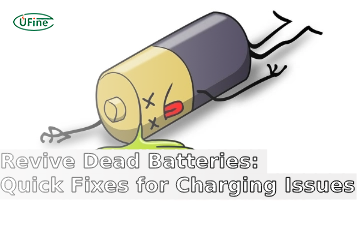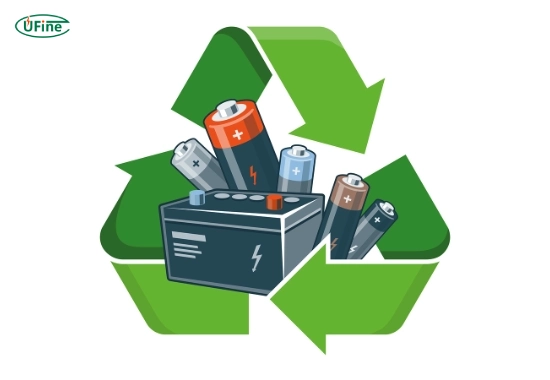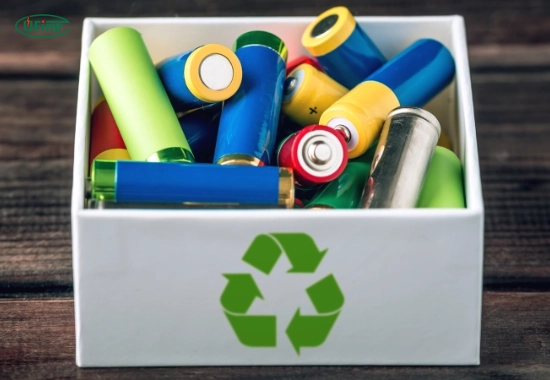
- Part 1. Why it's dangerous to throw batteries in the trash
- Part 2. What types of batteries are we talking about?
- Part 3. Can I throw alkaline batteries in the trash?
- Part 4. Why are rechargeable batteries more dangerous
- Part 5. Are car batteries safe to throw away?
- Part 6. What happens if I throw batteries in the trash?
- Part 7. Where can I safely dispose of batteries?
- Part 8. How to safely store batteries before disposal
- Part 9. Are there eco-friendly alternatives to disposable batteries?
- Part 10. What do recycling symbols on batteries mean?
- Part 11. FAQs
Can I throw batteries in the trash? The short answer is no, most batteries should not be thrown in the trash. Batteries contain hazardous materials like heavy metals and corrosive chemicals that can harm the environment and pose safety risks. In many places, it’s even illegal to dispose of them with your regular garbage.
Proper disposal is essential, whether a small AA battery or a large car battery. This article will guide you through everything you need to know about battery types, the dangers of improper disposal, and where and how to recycle them safely.
Part 1. Why it’s dangerous to throw batteries in the trash
Throwing batteries in the trash isn’t just careless—it’s dangerous. Here’s why:
- Chemical leakage: Batteries contain mercury, lead, cadmium, and lithium, which can leak into the soil and groundwater when they break down in landfills. These substances can contaminate drinking water and disrupt ecosystems.
- Risk of fire: Some batteries, especially lithium-ion, can catch fire or explode if damaged or exposed to heat. These fires are hard to control and have been known to start in garbage trucks, landfills, and even recycling facilities.
- Toxic exposure: Improperly disposed batteries expose sanitation workers and wildlife to dangerous chemicals.
- Waste of resources: Batteries contain valuable metals that can be recovered and reused. Throwing them away wastes these resources.
In short, putting batteries in the trash is a health hazard, an environmental issue, and a missed recycling opportunity.
Part 2. What types of batteries are we talking about?
When we say, “Don’t throw batteries in the trash,” you may wonder: What kinds of batteries does this include?
Let’s break it down. Five major battery types are commonly used in household and industrial settings. Each type has different chemicals, uses, and disposal needs. Understanding these will help you know which batteries can be recycled, which are dangerous, and which ones might be okay to toss (in minimal cases).
1. Alkaline batteries
These are the most common batteries in remote controls, toys, clocks, and flashlights. They come in AA, AAA, C, D, and 9V sizes.
- Chemistry: Zinc and manganese dioxide
- Toxicity: Low compared to other types
- Disposal: In some areas, throwing them in the trash is legal because they no longer contain mercury. However, recycling is still recommended, as they contain reusable metals.
2. Rechargeable batteries
These include lithium-ion, nickel-cadmium (NiCd), and nickel-metal hydride (NiMH) batteries in smartphones, laptops, cameras, and power tools.
- Chemistry: Varies by type—some contain lithium, cobalt, cadmium, or nickel.
- Toxicity: High, especially cadmium and lithium.
- Disposal: Never throw these in the trash. They must be taken to a certified battery recycling location.
3. Button cell batteries
Small round batteries are used in watches, calculators, hearing aids, and toys.
- Chemistry: Often contains silver oxide, lithium, or mercury.
- Toxicity: High, especially those that contain mercury.
- Disposal: Must be recycled. These batteries are extremely hazardous if swallowed, especially for children and pets.
4. Lead-acid batteries (car batteries)
These are used in vehicles, motorcycles, and some backup power systems.
- Chemistry: Lead and sulfuric acid
- Toxicity: Extremely high
- Disposal: Illegal to throw in the trash in most places. They need to be returned to auto stores or hazardous waste programs. Many locations offer cash-back or credit when you return them.
5. Lithium primary batteries
These are non-rechargeable lithium batteries used in cameras, smoke detectors, and medical devices.
- Chemistry: Lithium metal
- Toxicity: High
- Disposal: Like lithium-ion, they can start fires and must be recycled properly.
Part 3. Can I throw alkaline batteries in the trash?
Can I throw alkaline batteries in the trash? The answer depends on where you live.
In some states or countries, alkaline batteries are not classified as hazardous waste because they no longer contain mercury. In those places, it may be legal to dispose of them in the trash.
However, just because it’s legal doesn’t make it right. Alkaline batteries still contain zinc, manganese, and steel, which can be recovered and reused through recycling.
Best practice: Collect your used alkaline batteries and take them to a battery recycling drop-off point. You’ll keep metals out of landfills and reduce the need to mine new materials.
Part 4. Why are rechargeable batteries more dangerous
Rechargeable batteries may seem eco-friendly, but they’re also more dangerous if mismanaged.
Here’s why:
- They use high-density chemistries that can ignite or explode if punctured or exposed to heat.
- Many contain toxic metals like cadmium or cobalt, which harm humans and the environment.
- Fires caused by lithium batteries in the waste stream have cost recycling centers millions of dollars in damages.
Always recycle rechargeable batteries through certified programs like Call2Recycle or drop them off at electronics retailers that offer safe disposal boxes.
Part 5. Are car batteries safe to throw away?
Not.
Car batteries contain lead and acid, both of which are highly hazardous. Throwing a car battery in the trash is not only dangerous—it’s also illegal in most places.
Proper disposal options include:
- Auto parts stores (e.g., AutoZone, Advance Auto Parts)
- Mechanic shops
- Hazardous waste collection centers
Many sellers will take your old battery when you buy a new one. Some even offer a core charge refund, giving you cash or credit for recycling.
Part 6. What happens if I throw batteries in the trash?
If you toss batteries in your regular garbage, a few things can happen:
- Environmental contamination: Toxic substances can enter the air, soil, and waterways.
- Fires and explosions: Lithium batteries can ignite under pressure.
- Legal consequences: This can result in fines or penalties in states like California.
- Health risks: Waste workers may be exposed to harmful chemicals.
- Lost resources: Metals like lithium and cobalt are rare. Recycling helps conserve them.
The bottom line? Throwing batteries in the trash is never worth the risk.
Part 7. Where can I safely dispose of batteries?
There are many safe and easy ways to dispose of batteries:
- Local recycling programs: Your city or county may have a battery collection program.
- Retailers: Best Buy, Home Depot, Lowe’s, and Staples offer battery drop-off bins.
- Call2Recycle: This national program offers a search tool to find drop-off sites.
- Hazardous waste events: Cities often host free disposal days for batteries, paint, and chemicals.
- Mail-back services: Some companies sell recycling kits that let you send your batteries by mail.
Part 8. How to safely store batteries before disposal
If you’re collecting batteries for later recycling, follow these safety tips:
- Tape the terminals: Especially for lithium and 9V batteries. Use non-conductive tape.
- Store in a cool, dry place: Avoid heat and humidity.
- Use a plastic or cardboard box: Avoid metal containers, which can cause short circuits.
- Keep away from flammable materials
- Label the container: So others know it’s for used batteries.
This helps prevent fires and accidental exposure.
Part 9. Are there eco-friendly alternatives to disposable batteries?
Yes! Reducing how many batteries you use is one of the best ways to protect the environment.
Here are some eco-friendly alternatives:
- Rechargeable batteries: A single rechargeable battery can replace 300+ disposable ones.
- Solar-powered devices: Great for outdoor lighting, garden tools, and some chargers.
- USB-rechargeable gadgets: Many modern electronics no longer require disposable batteries.
- Battery-free tools: Crank-powered flashlights or manual devices are great backups.
Making the switch helps reduce waste and saves you money over time.
Part 10. What do recycling symbols on batteries mean?
Battery labels often have symbols to guide proper disposal. Here’s what they mean:
- Crossed-out trash can: This means do not throw in the trash.
- Pb: Contains lead.
- Cd: Contains cadmium.
- Li-ion: Lithium-ion battery.
- NiMH: Nickel-metal hydride battery.
These labels help you identify the battery type to dispose of it properly.
Part 11. FAQs
Can I throw AA batteries in the trash?
In some states, yes, recycling them whenever possible is better. Check local regulations.
What should I do with old phone batteries?
Take them to a certified recycler or a retail store with a battery drop-off bin. Never toss them in the trash.
Are button batteries dangerous?
Yes, especially if swallowed. They’re also hazardous waste and must be recycled.
Is it illegal to throw batteries in the trash in the U.S.?
In some places, yes. California, for example, bans all battery types from landfills.
How can I tell if a battery is rechargeable?
Look for labels like “rechargeable,” “NiMH,” “NiCd,” or “Li-ion.” These batteries should never go in the trash.
Related Tags:
More Articles

How to Revive Dead Batteries and Fix Lithium Batteries that Won’t Charge?
Learn how to safely revive a dead lithium-ion battery, troubleshoot charging issues, fix lithium battery problems, and extend battery life.
LiPo Battery Charge Rate Calculator
Calculate safe LiPo, Li-ion, and LiFePO4 battery charging times and rates. Prevent overcharging, extend life, and optimize performance.
4.0Ah vs. 2.0Ah Battery: Key Differences and Which is Best for Your Projects
Compare 2Ah vs 4Ah batteries: meaning, runtime, weight, and best tool uses. Learn if 4.0Ah is worth it for your cordless tools and DIY projects.
How Long do Lithium Batteries Last?
Learn how long lithium batteries last, their life expectancy, cycle life, and tips to extend lithium-ion battery lifespan effectively.
Lithium Battery Temperature Range: Everything You Need to Know
Learn optimal lithium battery temperature ranges for use and storage. Understand effects on performance, efficiency, lifespan, and safety.




